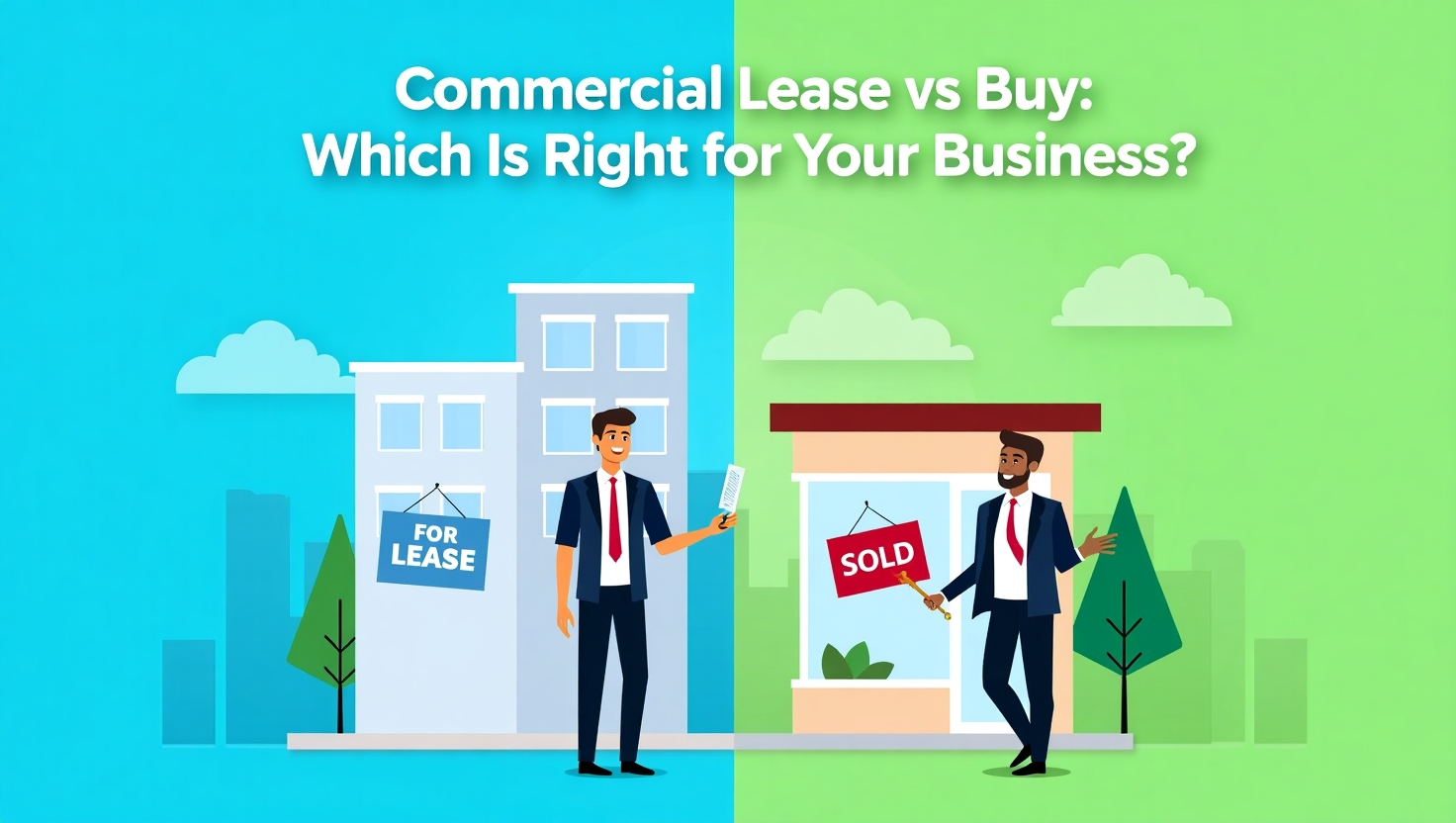
Commercial Lease vs Buy
When expanding or relocating your business, one of the most critical decisions you’ll face is whether to lease or buy commercial property. This choice can significantly impact your company’s financial stability, operational flexibility, and long-term growth. In this article, we’ll explore the pros and cons of both options to help you determine which is best for your business.
Understanding the Basics: Lease vs. Buy
Before diving into the details, let’s clarify what each option entails:
Leasing: Renting a property for business use, typically under a contract that outlines the terms of use, rent payments, and duration.
Buying: Purchasing a property outright, which involves a significant upfront investment but offers ownership and potential long-term benefits.
Both options have their merits, but the right choice depends on your business’s unique needs, financial situation, and future plans.
The Advantages of Leasing Commercial Property
Leasing offers several benefits, especially for businesses that prioritize flexibility and lower upfront costs.
1. Lower Initial Costs
Leasing typically requires less capital upfront compared to buying. Instead of a large down payment, you’ll usually pay a security deposit and the first month’s rent. This can be a crucial advantage for startups or businesses looking to preserve cash flow.
2. Flexibility and Scalability
A lease allows your business to adapt to changing needs. If your company grows rapidly, you can move to a larger space when the lease ends. Similarly, if you need to downsize, you’re not tied to a property that no longer suits your needs.
3. Maintenance and Repairs
In many lease agreements, the landlord is responsible for major repairs and maintenance. This can save your business time and money, allowing you to focus on core operations rather than property management.
The Drawbacks of Leasing
While leasing offers flexibility, it also comes with limitations that may not align with every business’s goals.
1. No Equity Buildup
When you lease, your monthly payments don’t contribute to ownership. Over time, this can feel like “throwing money away,” especially if property values in the area are rising.
2. Limited Control
Leasing means you’re subject to the landlord’s rules and restrictions. You may face limitations on how you can modify the space, and rent increases could strain your budget over time.
3. Uncertainty
Lease renewals aren’t always guaranteed. If the landlord decides to sell the property or change its use, you may be forced to relocate, disrupting your business operations.
The Benefits of Buying Commercial Property
Purchasing commercial real estate is a significant investment, but it can offer long-term advantages for businesses with stable growth and financial resources.
1. Building Equity
When you buy, each mortgage payment increases your ownership stake in the property. Over time, this can become a valuable asset that appreciates in value, providing a potential return on investment.
2. Tax Benefits
Owning commercial property can offer tax deductions, such as mortgage interest, property taxes, and depreciation. These deductions can reduce your overall tax burden and improve cash flow.
3. Full Control
As the owner, you have complete control over the property. You can make renovations, expansions, or other modifications without needing landlord approval, allowing you to tailor the space to your business’s needs.
The Challenges of Buying
Despite its advantages, buying commercial property isn’t without risks and challenges.
1. High Upfront Costs
Purchasing property requires a substantial down payment, often 20-30% of the property’s value. This can strain your business’s finances, especially if you’re also managing other growth-related expenses.
2. Maintenance Responsibilities
As the owner, you’re responsible for all maintenance and repairs. This can be costly and time-consuming, diverting resources away from your core business activities.
3. Less Flexibility
Owning property ties you to a specific location. If your business needs change, selling the property can be a lengthy and complex process, limiting your ability to adapt quickly.
Which Option Suits Your Business?
Deciding between leasing and buying depends on several factors, including your business’s financial health, growth projections, and long-term goals.
Choose Leasing If:
You need flexibility to relocate or expand.
You want to minimize upfront costs.
Your business is in a growth phase and may outgrow the space.
Choose Buying If:
You have the financial resources for a down payment.
You want to build equity and benefit from potential appreciation.
Your business is stable and unlikely to need a different location soon.
Just as regular exercise is essential for maintaining physical health, regularly evaluating your business’s real estate needs is crucial for sustaining growth and stability. Whether you lease or buy, the decision should align with your company’s strategic objectives.
Conclusion: Make an Informed Choice
The choice between leasing and buying commercial property is not one-size-fits-all. Each option has its pros and cons, and the best decision depends on your business’s unique circumstances. Take the time to assess your financial position, consult with real estate professionals, and consider your long-term goals before making a commitment.
By carefully weighing the benefits and challenges of each option, you can make an informed decision that supports your business’s success for years to come.







